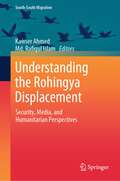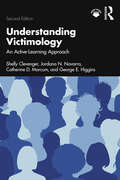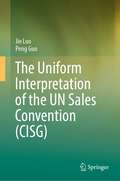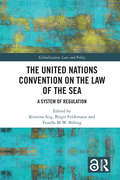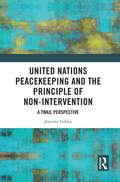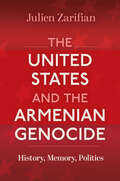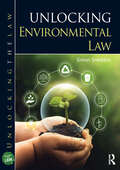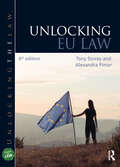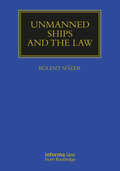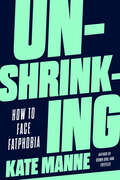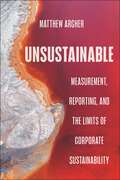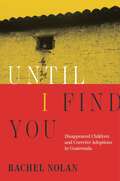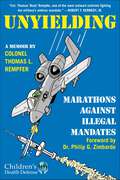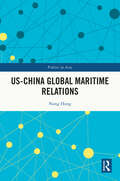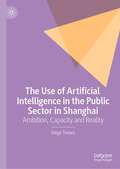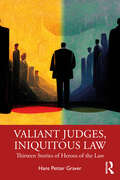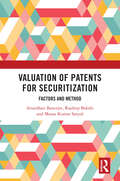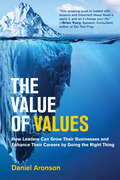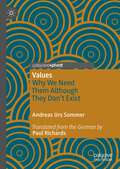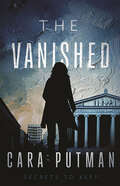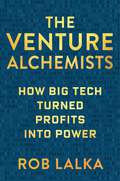- Table View
- List View
Understanding the Rohingya Displacement: Security, Media, and Humanitarian Perspectives (International Perspectives on Migration)
by Kawser Ahmed Md. Rafiqul IslamThis book provides a focused and comprehensive understanding of the conflict surrounding the Rohingya displacement, using a unique peace and conflict transformation viewpoint. Divided into four sections and nineteen chapters, it covers significant themes related to the conflict. It provides an in-depth examination of its security implications, media impact, and the need for a long-term transformation strategy. The authors offer a sharp perspective on the crisis, covering a wide range of topics, including human rights abuses, geopolitics, media influence, and repatriation of the Rohingya. Each chapter focuses on a different aspect of the conflict, providing readers with a thorough understanding of the Rohingya displacement-related conflict. The authors advocate for a peaceful end to the conflict through repatriation, offering valuable conflict transformation tools for decision-makers in Bangladesh and around the world. This book is essential for anyone seeking a deeper understandingof the conflict's security implications and highlights original research from academics on the role of the media. It is relevant for scholars, politicians, decision-makers in the security and refugee management fields, academics studying the media, and humanitarian actors.
Understanding Victimology: An Active-Learning Approach
by Shelly Clevenger Jordana N. Navarro Catherine D. Marcum George E. HigginsUnderstanding Victimology: An Active Learning Approach is the only textbook with extensive discussion of both online and offline victimization reinforced by group and individual learning activities. Our textbook offers instructors a variety of active learning exercises – in the book itself and in the authors’ ancillaries – that engage students in the material and shed light on the experiences of marginalized social groups. Through these activities, students become engaged with the material at a higher level of learning. They learn how victimization happens and the challenges people who experience crime face in acquiring assistance from the criminal-legal system at a more intimate level instead of simply reading about it. Students also build their abilities to work with others in a collaborative learning environment, encouraging professional socialization for the future. The chapters in this second edition address gaps in information typically presented in victimology that ignore prevention or intervention, even though these topics are currently at the forefront of the national conversation going on about sexual violence in higher education. New to this edition are added coverage of immigrants and minorities and new chapters on the media and victimization and on victimization across the gender spectrum, as well as an online instructor resource covering UK case studies, legal framework, and social context that broadens the book’s global appeal. Suitable for undergraduate courses in victimology, this book also serves the needs of sociology and women’s studies courses and can be taught university-wide as part of diversity and inclusion initiatives.
The Uniform Interpretation of the UN Sales Convention (CISG)
by Jie Luo Peng GuoThe unification of international commercial law has been a common course for every country of the world. The U.N. Convention on Contracts for International Sale of Goods (CISG) is a milestone in creating a uniform law in the field of the international sale of goods. The CISG coordinated divergent political, economic, and legal systems combined different contract laws and set up a comprehensive and independent legal framework for the international sale of goods. This book examines the basic requirements and criteria of the CISG’s interpretation and investigates how to achieve the uniform interpretation of the CISG based on interpretation rules in the CISG and through appropriate legal interpretation approaches. As a comprehensive and uniform legal framework for the international sale of goods, the CISG still has gaps to fill. Therefore, a uniform interpretation in gap-filling is equally important for the CISG. This book discusses gap-filling in the CISG, explains why and how to fill its gaps, clarifies gap-filling approaches, their order of application, and eventually concentrates on general principles and the uniform interpretation of the CISG. Another feature of the book is to discuss the supplementary materials that could be used to assist in the uniform interpretation of the CISG. PICC, foreign cases, UNCITRAL Digest, and the CISG Advisory Council opinions will be examined in detail to see whether and how they can fill the gaps in the CISG and promote its uniform interpretation. Only by clarifying the basic requirements and principles relating to the CISG’s uniform interpretation, can courts and arbitral tribunals correct their attitude toward and practices in the interpretation of the CISG. Only by following the autonomous interpretation approach, can the CISG achieve its goal to unify the sale of goods laws and promote the development of international commerce.
The United Nations Convention on the Law of the Sea: A System of Regulation (Globalization: Law and Policy)
by Kristina Siig Birgit Feldtmann Fenella M.W. BillingThe 1982 United Nations Convention on the Law of the Sea (UNCLOS) has for four decades been considered by many to be one of the most important legislative achievements of international law. It is revered as a "constitution of the oceans", providing the legal framework for the governance of the oceans. This volume explores how the UNCLOS is functioning in various complex settings, how it adapts to new, emerging developments, as well as how it interacts with other regulation, both within the law of the sea regime and outside. Engaging in themes such as law and order at sea, UNCLOS’ interaction with human rights and the role of private actors, the book raises complex questions in the application, understanding, and enforcement of the convention and how it can be envisaged, interpreted, and used in a dynamic world. The volume also raises methodological questions, the answers to which may enhance the predictability and coherence of the law under UNCLOS and thus secure its role as the predominant and relevant system for legal governance at sea for many decades to come. As a contribution to ensuring the future relevance of UNCLOS, the book will be a valuable resource for scholars, diplomats, judges and other practitioners who are working with and interpreting the law of the sea and related issues of maritime law, migration law, human rights law and humanitarian law.
The United Nations Convention on the Law of the Sea: A System of Regulation (Globalization: Law and Policy)
by Kristina Siig Birgit Feldtmann Fenella M.W. BillingThe 1982 United Nations Convention on the Law of the Sea (UNCLOS) has for four decades been considered by many to be one of the most important legislative achievements of international law. It is revered as a "constitution of the oceans", providing the legal framework for the governance of the oceans. This volume explores how the UNCLOS is functioning in various complex settings, how it adapts to new, emerging developments, as well as how it interacts with other regulation, both within the law of the sea regime and outside. Engaging in themes such as law and order at sea, UNCLOS’ interaction with human rights and the role of private actors, the book raises complex questions in the application, understanding, and enforcement of the convention and how it can be envisaged, interpreted, and used in a dynamic world. The volume also raises methodological questions, the answers to which may enhance the predictability and coherence of the law under UNCLOS and thus secure its role as the predominant and relevant system for legal governance at sea for many decades to come.As a contribution to ensuring the future relevance of UNCLOS, the book will be a valuable resource for scholars, diplomats, judges and other practitioners who are working with and interpreting the law of the sea and related issues of maritime law, migration law, human rights law and humanitarian law.
United Nations Peacekeeping and the Principle of Non-Intervention: A TWAIL Perspective
by Jennifer GiblinUsing a unique application of Third World Approaches to International Law (TWAIL), this book provides a critical, interdisciplinary, examination of the contemporary practice of UN peacekeeping.Is peacekeeping intervention? Since its conception in the mid-1950s, peacekeeping has significantly evolved from traditional, lightly armed, passive operations to robust, multi-dimensional stabilisation peacekeeping operations. This raises questions as to whether this is simply a natural evolution of peacekeeping or whether it marks an expansion of the concept beyond its boundaries, pushing it into the realm of peace enforcement or intervention. In response, this book examines the frameworks which govern UN peacekeeping and seeks to understand the relationship between peacekeeping and the principle of non-intervention. Providing practical examples from the United Nations’ operations in the Democratic Republic of the Congo and drawing upon interviews with key international actors including UN personnel, the book explores the boundaries of peacekeeping, contending that peacekeeping, at times, becomes a form of intervention. This, the book argues, is detrimental both to the concept of peacekeeping and to the host state, and it concludes by offering a series of recommendations to re-affirm peacekeeping’s boundaries and amplify the effectiveness of contemporary peacekeeping. This book will be of interest to scholars and students in international law, international relations, politics, history and criminology.
The United States and the Armenian Genocide: History, Memory, Politics (Genocide, Political Violence, Human Rights)
by Julien ZarifianDuring the first World War, over a million Armenians were killed as Ottoman Turks embarked on a bloody campaign of ethnic cleansing. Scholars have long described these massacres as genocide, one of Hitler’s prime inspirations for the Holocaust, yet the United States did not officially recognize the Armenian Genocide until 2021. This is the first book to examine how and why the United States refused to acknowledge the Armenian Genocide until the early 2020s. Although the American government expressed sympathy towards the plight of the Armenians in the 1910s and 1920s, historian Julien Zarifian explores how, from the 1960s, a set of geopolitical and institutional factors soon led the United States to adopt a policy of genocide non-recognition which it would cling to for over fifty years, through Republican and Democratic administrations alike. He describes the forces on each side of this issue: activists from the US Armenian diaspora and their allies, challenging Cold War statesmen worried about alienating NATO ally Turkey and dealing with a widespread American reluctance to directly confront the horrors of the past. Drawing from congressional records, rare newspapers, and interviews with lobbyists and decision-makers, he reveals how genocide recognition became such a complex, politically sensitive issue.
Unlocking Environmental Law (Unlocking the Law)
by Simon SneddonUnlocking Environmental Law is the essential introduction to this fascinating, controversial, and fast-moving area of contemporary law, ensuring that you grasp the main concepts with ease. Containing accessible explanations in clear and precise terms that are easy to understand, it provides an excellent foundation for learning and revising Environmental Law. Split into three parts, the book outlines the philosophical foundations of environmental law, and how these have influenced political decision-making. The information is clearly presented in a logical structure and the following features support learning, helping you to advance with confidence: • clear learning outcomes at the beginning of each chapter set out the skills and knowledge you will need to get to grips with the subject; • key facts boxes throughout each chapter allow you to progressively build and consolidate your understanding; • end-of-chapter summaries provide a useful check-list for each topic; •cases and judgments are highlighted to help you find them and add them to your notes quickly; • frequent activities and self-test questions and sample essay questions are included so you can put your knowledge into practice; • a brand new ‘critiquing the law’ feature is designed to foster essential critical thinking skills. Charting the development of regulations, examining emerging and future trends for environmental law, and looking at specific areas of law, including air pollution, climate change, laws around water, and the regulation of social and private space, this concise, accessible text is ideal for anyone new to environmental law.
Unlocking EU Law (Unlocking the Law)
by Tony Storey Alexandra PimorEuropean Union Law is a core element of every law degree in England and Wales. Unlocking EU Law will ensure you grasp the main concepts with ease. Containing accessible explanations in clear and precise terms that are easy to understand, it provides an excellent foundation for learning and revising EU Law. The information is clearly presented in a logical structure and the following features support learning, helping you to advance with confidence: Clear learning outcomes at the beginning of each chapter set out the skills and knowledge you will need to get to grips with the subject; Key Facts boxes throughout each chapter allow you to progressively build and consolidate your understanding; End-of-chapter summaries provide a useful check-list for each topic; Cases and judgments are highlighted to help you find them and add them to your notes quickly; Frequent activities and self-test questions and sample essay questions are included so you can put your knowledge into practice; A brand new ‘critiquing the law’ feature is designed to foster essential critical thinking skills. This 6th edition has been fully updated to include discussion of all key changes and developments in the law, including new legal provisions in relation to Covid-19, major case developments and changes to legal treaties.
Unmanned Ships and the Law (Maritime and Transport Law Library)
by BÜLENT SÖZERThis book considers the law relating to the legal aspects of unmanned ships. The author, a doyen of shipping and insurance law from Turkey, delves into the current international legal regime and examines the probable impact of unmanned ships on liability and carriage of goods in a wide-ranging manner. He examines both the legal aspects and technological peculiarities of unmanned ships, as well as contemplating terminological and linguistic questions, to find out whether they can be compatible with the current legal regime applicable to ships in general, while considering alternatives to enable their successful use in the near future. Unmanned Ships and the Law is therefore important not just for legal practitioners and academics in shipping and insurance but all those in related industries of shipbuilding, computer technology and communications.
Unshrinking: How to Face Fatphobia
by Kate ManneThe definitive takedown of fatphobia, drawing on personal experience as well as rigorous research to expose how size discrimination harms everyone, and how to combat it—from the acclaimed author of Down Girl and Entitled&“An elegant, fierce, and profound argument for fighting fat oppression in ourselves, our communities, and our culture.&”—Roxane Gay, author of HungerFor as long as she can remember, Kate Manne has wanted to be smaller. She can tell you what she weighed on any significant occasion: her wedding day, the day she became a professor, the day her daughter was born. She&’s been bullied and belittled for her size, leading to extreme dieting. As a feminist philosopher, she wanted to believe that she was exempt from the cultural gaslighting that compels so many of us to ignore our hunger. But she was not.Blending intimate stories with the trenchant analysis that has become her signature, Manne shows why fatphobia has become a vital social justice issue. Over the last several decades, implicit bias has waned in every category, from race to sexual orientation, except one: body size. Manne examines how anti-fatness operates—how it leads us to make devastating assumptions about a person&’s attractiveness, fortitude, and intellect, and how it intersects with other systems of oppression. Fatphobia is responsible for wage gaps, medical neglect, and poor educational outcomes; it is a straitjacket, restricting our freedom, our movement, our potential.In this urgent call to action, Manne proposes a new politics of &“body reflexivity&”—a radical reevaluation of who our bodies exist in the world for: ourselves and no one else. When it comes to fatphobia, the solution is not to love our bodies more. Instead, we must dismantle the forces that control and constrain us, and remake the world to accommodate people of every size.
Unsustainable: Measurement, Reporting, and the Limits of Corporate Sustainability
by Matthew ArcherA behind-the-scenes look at how corporate and financial actors enforce a business-friendly approach to global sustainabilityIn recent years, companies have felt the pressure to be transparent about their environmental impact. Large documents containing summaries of yearly emissions rates, carbon output, and utilized resources are shared on companies’ social media pages, websites, and employee briefings in a bid for public confidence in corporate responsibility.And yet, Matthew Archer argues, these metrics are often just hollow symbols. Unsustainable contends with the world of big banks and multinational corporations, where sustainability begins and ends with measuring and reporting. Drawing on five years of research among sustainability professionals in the US and Europe, Unsustainable shows how this depoliticizing tendency to frame sustainability as a technical issue enhances and obscures corporate power while doing little, if anything, to address the root causes of the climate crisis and issues of social inequality. Through this obsession with metrics and indicators, the adage that you can’t manage what you can’t measure transforms into a belief that once you’ve measured social and environmental impacts, the market will simply manage them for you.The book draws on diverse sources of evidence—ethnographic fieldwork among a wide array of sustainability professionals, interviews with private bankers, and apocalyptic science fiction—and features analyses of name-brand companies including Volkswagen, Unilever, and Nestlé. Making the case for the limits of measuring and reporting, Archer seeks to mobilize alternative approaches. Through an intersectional lens incorporating Black and Indigenous theories of knowledge, power and value, he offers a vision of sustainability that aims to be more effective and more socially and ecologically just.
Until I Find You: Disappeared Children and Coercive Adoptions in Guatemala
by Rachel NolanThe poignant saga of Guatemala’s adoption industry: an international marketplace for children, built on a foundation of inequality, war, and Indigenous dispossession.In 2009 Dolores Preat went to a small Maya town in Guatemala to find her birth mother. At the address retrieved from her adoption file, she was told that her supposed mother, one Rosario Colop Chim, never gave up a child for adoption—but in 1984 a girl across the street was abducted. At that house, Preat met a woman who strongly resembled her. Colop Chim, it turned out, was not Preat’s mother at all, but a jaladora—a baby broker.Some 40,000 children, many Indigenous, were kidnapped or otherwise coercively parted from families scarred by Guatemala’s civil war or made desperate by unrelenting poverty. Amid the US-backed army’s genocide against Indigenous Maya, children were wrested from their villages and put up for adoption illegally, mostly in the United States. During the war’s second decade, adoption was privatized, overseen by lawyers who made good money matching children to overseas families. Private adoptions skyrocketed to the point where tiny Guatemala overtook giants like China and Russia as a “sender” state. Drawing on government archives, oral histories, and a rare cache of adoption files opened briefly for war crimes investigations, Rachel Nolan explores the human toll of an international industry that thrives on exploitation.Would-be parents in rich countries have fostered a commercial market for children from poor countries, with Guatemala becoming the most extreme case. Until I Find You reckons with the hard truths of a practice that builds loving families in the Global North out of economic exploitation, endemic violence, and dislocation in the Global South.
Unyielding: Marathons Against Illegal Mandates
by Thomas L. RempferUnyielding tackles a recurring topic of national importance as a history lesson for future generations. Controversial illegal medical mandates impacted military populations for many decades, but it was not until the COVID-era that the American people witnessed similar overreach. Colonel Tom &“Buzz&” Rempfer&’s memoir retraces the anthrax vaccine history since it marked the first time the military was served with court rulings condemning premeditated illegal experimentation on our nation&’s troops. The advent of COVID mandates, imposed on the population in 2021, gave the American people a taste of the mistreatment previously reserved for our nation&’s warriors. Legal protections enacted by the Congress to guard against medical experimentation, meant to ensure safe, effective, and FDA-approved products, were instead adulterated to foist mandates on American society. According to the FBI, the motive for the anthrax letter lab leaks in 2001 was to &“rejuvenate&” the &“failing&” anthrax vaccine. Similarly, the suspected Wuhan lab leak two decades later resulted in a push for COVID injections. The pattern of fear-based bioincidents resulting from reckless biodefense enterprises, and lessons not learned with illegal mandates, paralyzed government and military leaders while wreaking havoc on the trust and health of our troops and the American people. Buzz&’s decades-long analysis of the breakdowns stands as a unique treatise on the failures of leaders to learn lessons from these enduring clashes and to correct the damage. Future generations will sort out the aftermath, but in the meantime, Colonel Rempfer&’s Unyielding effort attempts to ensure that the lessons are not lost.
Urban Surfaces, Graffiti, and the Right to the City
by Sabina AndronThis landmark book focuses on urban surfaces, on exploring their authorship and management, and on their role in struggles for the right to the city. Graffiti, pristine walls, advertising posters, and municipal signage all compete on city surfaces to establish and imprint their values on our environments. It is the first time that the surfacescapes of our cities are granted the entire attention of a book as material, visual, and legal territories. The book includes a critical history of graffiti and street art as contested surface discourses and argues for surfaces as sites of resistance against private property, neoliberal creativity, and the imposition of urban order. It also proposes a seven-point manual for a semiotics of urban surfaces, laying the ground for a new discipline: surface studies. Page after page and layer after layer, surfaces become porous and political and emerge as key spatial conditions for rethinking and re-practicing urban dwelling and spatial justice. They become what the author terms the surface commons. The book will appeal to a wide readership across the disciplines of urban studies, architectural theory and design, graffiti, street art and public art, criminology, semiotics, visual culture, and urban and legal geography. It will also serve as a tool for city scholars, policy makers, artists, and vandals to disrupt existing imaginaries of order, justice, and visibility in cities.
Urban Surfaces, Graffiti, and the Right to the City (ISSN)
by Sabina AndronThis book explores the ownersheir authorship and management, and their role in struggles for the right to the city. Includes a critical history of graffiti and street art as contested surface discourses. Interdisciplinary appeal.
US-China Global Maritime Relations (Politics in Asia)
by Nong HongThis book explores the U.S.-China maritime relationship, examining the development and implementation of the maritime strategies of both the United States and China. Delving into the U.S.-China maritime relationship within the global context, the book investigates six key maritime regions: the South China Sea, the Northeast Asia waters (the East China Sea, the Yellow Sea), the Indian Ocean, the South Pacific Ocean, as well as the Arctic and Antarctic regions. Its observations form a comprehensive exploration of these regions and their significance in shaping the dynamics between the two nations, and this analysis reveals that an expanded view is necessary to discover and clearly display the role that these maritime regions currently—and could potentially—play in overarching U.S.-China relations. Examining both the ongoing conflicts and opportunities for cooperation in the global maritime domain between the United States and China, this book will be a valuable resource to students and scholars of international relations, Chinese and U.S. politics, strategic studies, and maritime studies.
The Use of Artificial Intelligence in the Public Sector in Shanghai: Ambition, Capacity and Reality
by Diego TodaroThis book examines how Shanghai aims to improve public service provision by accelerating the use of artificial intelligence (AI) in the public sector. After clarifying the technical and social factors that shape the use of AI in this area, the book delves into the AI policy environment and AI ecosystem of Shanghai to gauge the city’s capacity to implement public sector AI applications. Then it examines how this capacity translates into real-world policy initiatives through the investigation of case studies. It highlights the analytical, operational and political capabilities that determine the strengths and limitations of such initiatives in deploying AI in the public sector, and it assesses their impacts on public service provision in Shanghai. By using the findings on Shanghai to gain a deeper understanding of key topics in public sector AI research, this book also contributes new knowledge about the use of AI to improve the provision of public services.
Utilitarianism in Outer Space: Space Policy, Socioeconomic Development and Security Strategies in Nigeria and South Africa (Southern Space Studies)
by Samuel OyewoleThis book showcases Nigerian and South African experiences on space politics, policy and strategy vis-à-vis their development and security aspirations, while contributing to the broader African and the Global-South perspectives on the subject. Space policy in developing countries such as Nigeria and South Africa is motivated by utilitarian promises that space and the attendant technologies have the potential to advance development and security interests of the affected nations. However, several decades into the orbital journey of these countries, little is known of their space politics, policies, strategies, capacities and capabilities, and realisation of desired objectives. Beyond pure and applied sciences reductionism, this book offers social science perspectives on space studies in Africa, as it examines the intricate relationships of historical, geographical, social, demographic, economic, political, administrative, and strategic factors, nationally, regionally and globally that have shaped research and development of space science and technologies, and their benefits, in Nigeria and South Africa.
Valiant Judges, Iniquitous Law: Thirteen Stories of Heroes of the Law
by Hans Petter GraverThis book is about heroes of law. It provides examples of when judges have exercised courage, moderation, wisdom, and justice rather than blindly following the law. It also discusses the contentious issue of whether a judge has a moral responsibility to defend the rule of law, regardless of what the law actually states. The work presents a collection of thirteen stories about judges who in different settings have stood up against the authorities and public opinion in the defence of the rule of law. An introductory chapter sets the scene with two examples of situations gone wrong when those applying the law have just followed the demands of those in power. The thirteen stories are followed by two theoretical chapters discussing the moral responsibility of the judge. Finally, the book explores the kind of ethical theory required to guide judges in the assessments they must make, and the choices they have to take in order to fulfil their moral responsibilities. It is argued that the classic virtues of courage, moderation, wisdom, and justice are all qualities that can contribute to both sound judgment and reflection. The book thus seeks to nurture a realistic culture and a tradition of cultivating lawyers who defend the rule of law. Against a background where the history of our legal institutions when put to the test, is largely nothing to be proud of, the work seeks to change this by highlighting and reflecting on the exceptions. The book will be illuminating reading for students and academics working in the areas of Jurisprudence, Legal Ethics, and Legal History.
Valuation of Patents for Securitization: Factors and Method
by Arundhati Banerjee Rajdeep Bakshi Manas Kumar SanyalIntellectual property rights and assets have become a major contributor to market capitalization for different companies. This book discusses the processes of valuation of patents and the legal and regulatory concerns around patent securitization.Patents are used as an instrument of securitization to attract funds towards supporting further research and monetisation which opens-up new areas of research. They are utilised through means such as licensing, sale and purchase, financing and others. This book provides an in-depth look into the importance of patents and more importantly their securitization. It analyses the patent securitization applications as well as existing methods towards gauging the suitability of patents. The authors explore simple yet suitable methods for the valuation of patents that can be applied to the existing models to arrive at a pragmatic value. The book also includes studies and tests these systems for their reliability and application in different research areas and companies.This book will be of interest to practitioners involved in financing and monetisation of patents, academics, researchers and students working in patent valuation, financial management, economics international economics.
The Value of Values: How Leaders Can Grow Their Businesses and Enhance Their Careers by Doing the Right Thing (Management on the Cutting Edge)
by Daniel AronsonHow business leaders can grow profits and competitive advantage by doing the right thing.Acting on values—doing good for the benefit of all—can substantially benefit the bottom line, but many business leaders mistakenly believe that doing the right thing lowers profits. This belief is the greatest barrier holding businesses back from being more financially and competitively successful—and delivering more good for the world. Not only can it be a winning business strategy to act on values, as Daniel Aronson suggests in The Value of Values, but it is also a savvy choice, increasing a company&’s power, profit, and competitive advantage—in many cases with little additional investment or risk.It starts with seeing what others miss. Using extensive research and real-world calculations, Aronson demonstrates that the &“submerged value&” of initiatives such as taking bold action to combat climate change, helping people find jobs, or creating an open, inclusive work environment is normally 4 to 10 times more than initially believed. Calculating and capturing the true business benefit of acting on values provides a much-needed update to the sustainability and responsibility playbook. Even more important, it shows executives how to harness the value of values to improve profitability, acquire customers, and turbocharge their own careers.Written by a measurement pioneer and one of the world&’s foremost experts on making ethical business count, The Value of Values trains leaders to respond smartly and credibly to today&’s challenges, transforming how business can and should be done.
Values: Why We Need Them Although They Don’t Exist
by Andreas Urs SommerIn his book, Andreas Urs Sommer reflects on the question of what it really means when everybody’s appealing to values, all the time – the question, fundamentally, of what values actually are. Values explores both of these points, arriving at two intriguing suggestions: Maybe what we call values are just a set of elaborate fictions. And maybe those fictions serve some very important purposes.
The Vanished: A Novel
by Cara Putman"Putman's legal expertise shines in this compelling and intricately plotted romantic suspense. Highly recommended!" --Colleen Coble, USA Today best-selling author Janae Simmons left the small town of Kedgewick, Virginia, ten years ago to pursue her legal career and never looked back--until a professional mistake leads her to her grandmother's historic carriage house and to the town where her past threatens to find her. The quiet streets echo with her grandfather's sterling reputation, one that conflicts with fresh questions that claw at Janae, launching her on a reluctant journey to unearth his secrets. When her new job at a local law firm doesn't live up to expectations, she wonders if coming home was the right decision. Carter Montgomery starts his art preservation career with the only job he can get--director at the Elliott Museum of Art. At least Kedgewick is a nice enough town to provide him and his nephew with a safe place to grieve the loss of Carter's sister. But Carter's calm days disappear when an elderly woman claims two paintings in the museum's collection were stolen from her family during World War II. Carter enlists Janae's help to unravel the legal labyrinth of art ownership, and the peaceful facade of Kedgewick morphs into a hot bed of secrets. When an attorney turns up dead and Janae uncovers another painting, what began as a simple legal issue spirals into a race against time. As the web of intrigue tightens, the duo must confront a looming question: What dark truths lie beneath the surface, waiting to be exposed? "Cara Putman has once again created an exciting cast of characters. I was immediately drawn in by Janae and Carter's unique chemistry. This is one story you don't want to miss." --Rebecca Hemlock, award-winning author of Fury in the Shadows
The Venture Alchemists: How Big Tech Turned Profits Into Power
by Rob LalkaWe once idolized tech entrepreneurs for creating innovations that seemed like modern miracles. Yet our faith has been shattered. We now blame them for spreading lies, breaking laws, and causing chaos. Yesterday’s Silicon Valley darlings have become today’s Big Tech villains. Which is it? Are they superheroes or scoundrels? Or is it more complicated, some blend of both?In The Venture Alchemists, Rob Lalka demystifies how tech entrepreneurs built empires that made trillions. Meta started as a cruel Halloween prank, Alphabet began as a master’s thesis that warned against corporate deception, and Palantir came from a campus controversy over hateful speech. These largely forgotten origin stories show how ordinary fears and youthful ambitions shaped their ventures—making each tech tale relatable, both wonderfully and tragically human. Readers learn about the adversities tech entrepreneurs overcame, the troubling tradeoffs they made, and the tremendous power they now wield. Using leaked documents and previously unpublished archival material, Lalka takes readers inside Big Tech’s worst exploitations and abuses, alongside many good intentions and moral compromises.But this story remains unfinished, and The Venture Alchemists ultimately offers hope from the people who, decades ago, warned about the risks of the emerging Internet. Their insights illuminate a path toward more responsible innovations, so that technologies aren’t dangerous weapons but valuable tools that ensure progress, improve society, and enhance our daily lives.
